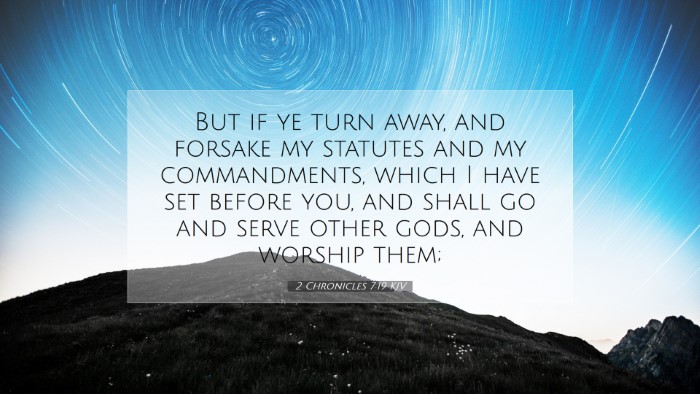Commentary on 2 Chronicles 7:19
Verse Context: 2 Chronicles 7:19 states:
"But if ye turn away, and forsake my statutes and my commandments, which I have set before you, and shall go and serve other gods, and worship them;" (2 Chronicles 7:19 KJV)
Overview of 2 Chronicles 7
The seventh chapter of 2 Chronicles captures a significant moment in Israel's history following the dedication of Solomon's temple. After a divine response to Solomon's prayer, God makes a covenant with the people, affirming His presence and conditions for blessing. Verses 19 to 22, as part of this covenant, emphasize the consequences of abandoning the path set by God.
Commentary Insights
Matthew Henry’s Commentary
Matthew Henry notes that God’s promise of blessing is conditional upon Israel’s obedience to His statutes. The warning presented in verse 19 serves as a pivot point, illustrating the grave consequences of forsaking divine commands. Henry emphasizes that forsaking God leads not only to spiritual decay but also to national calamity.
- Obedience Essential: Henry highlights that the peace and prosperity promised cannot be enjoyed without fidelity to God’s law.
- Idolatry: A Dreadful Turn: The act of serving other gods signifies a complete abandonment of faith, which Henry describes as a perilous decision that destroys both individuals and communities.
Albert Barnes' Notes on the Bible
Albert Barnes elaborates on the implications of turning away from God and the instruction to maintain loyalty to His commandments. He indicates that the impending calamities serve as a natural consequence of spiritual negligence, portraying the clear relationship between national sin and divine judgment.
- Repentance Required: Barnes asserts that the people must turn back to God, pointing to the necessity of repentance to reverse the consequences of their sins.
- Warned but Not Forsaken: He stresses that even in warning, God offers redemption. The fidelity of the people can restore their blessed state and bring back God’s favor.
Adam Clarke's Commentary
Adam Clarke adds a deeper theological reflection on the warning against idolatry. He notes that the Israelites had a history of frequently turning to foreign gods and the consequences that ensued from such actions. Clarke connects this verse to the broader narrative of Israel's relationship with God through cycles of faithfulness and rebellion.
- Consequences of Apostasy: Clarke underscores that the abandonment of God's commandments leads to not just individual judgment but to a collective identity crisis for the nation.
- Call to Loyalty: He emphasizes loyalty as the highest form of worship, directly correlating obedience with a nation’s success and prosperity.
Theological Implications
The theological implications of 2 Chronicles 7:19 extend beyond individual adherence to divine commandments. It reflects a community’s role in maintaining covenant faithfulness. Various scholars emphasize the importance of collective responsibility. The abandonment of God is often seen as a national sin, with repercussions that resonate through generations.
Practical Applications
For pastors and leaders, the insights derived from this verse offer a basis for teaching about the importance of divine integrity and commitment to God's ordinances. It serves as a reminder of the necessity of vigilant leadership against idolatry, which may come in various modern forms.
- Teaching on Idolatry: Leaders can draw parallels between ancient practices and contemporary sources of spiritual distraction, fostering awareness and commitment among congregants.
- Encouraging Repentance: Emphasizing the need for repentance can rejuvenate congregational life, turning hearts back toward God and away from secular influences.
Conclusion
2 Chronicles 7:19 serves as a poignant reminder of the covenant relationship between God and His people. The findings from the commentaries by Henry, Barnes, and Clarke illuminate the vital nature of faithfulness and the grave consequences of turning away from God's commandments. Their teachings urge believers to maintain vigilance in their spiritual lives, reflecting a collective commitment to uphold the integrity of their faith for future generations.


